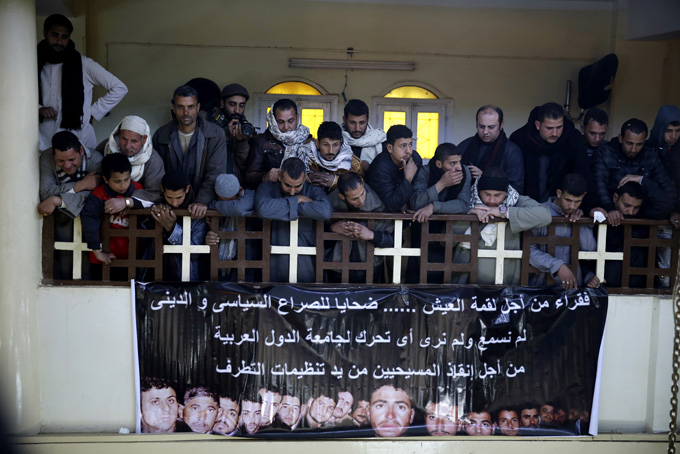
They were young and largely impoverished. To find work, they had migrated from their native Egypt to a mid-coastal city in Libya, an unstable country that in recent years has become extremely attractive to agents of the Islamic State of Iraq and Syria, more commonly known as ISIS or ISIL, a group of murderers masquerading as Muslims.
Agents of the Libyan branch of ISIS seized the 21 men and, according to a video released by the terrorist organization, they were beheaded last weekend – one at a time. The murdered men all had one thing in common – they were Copts, members of an ancient Egyptian church that may be the world’s oldest Christian denomination.
The deaths of these men should stir the souls of the architects of the 2003 invasion of Iraq, for the savage murder of these young men is one of the consequences of that war. The invasion, coupled with the dismantling of that nation’s military and security force, created an unstable region that has increasingly had reverberations around the world (more on that later).

The death of these men is horrific on so many levels. First, it is just one of several body blows Egyptian Copts have endured in recent years. Copts are Egypt’s largest religious minority and make up more than 10 percent of the population. The Egyptian Coptic Orthodox Church traces its origins to the First Century, when St. Mark, one of Jesus’ disciples, introduced Christianity to Alexandria. The church’s worldwide members number about 12 million. Like the Catholic Church, it has a pope. The Coptic Church is credited with introducing monasticism – a religious practice in which devotees fully commit their lives to spiritual work – to Christianity.
But Copts also are marginalized, oppressed and sometimes brutalized.
In the last half-century, clashes between Copts and Muslims has resulted in the deaths of many Copts. In 2011, a car bomb went off outside a Coptic church, killing dozens and injuring dozens more. In 2010, a Muslim mob attacked a group of Copts celebrating the birth of Christ.
There also have been reports of Coptic women being abducted by Muslims, forcibly converted to Islam and married off against their will to Muslim men.
Like many Christian groups in several Middle Eastern countries, such as Iraq and Syria, Copts have become more vulnerable in recent years. This has been particularly so since the overthrow of Egyptian strongman Hosni Mubarak.
Second, while the senseless killings of these men is just another example in the long line of the psychopathic brutality by ISIS, it is also a reminder what’s at stake in this fight.
In the wake of the beheadings, Egypt commenced airstrikes early last week on parts of Libya believed to be strongholds for this group. Egypt, which has lost hundreds of soldiers and police officers to Islamic militants in recent years, has a vested interest in this fight. So does the rest of the world.
Italy, which is just north of Libya, worries that ISIS may extend its operations to Rome. Italian officials believe they may not be militarily prepared to confront this beast.
On the African continent, there is increasing concern about the possibility of a strong alliance between ISIS and Boko Haram, which has been wreaking havoc in northern Nigeria for the past six years, resulting in the deaths of more than 20,000 people and the displacement of more than 1.5 million.
To date, the conflict with Boko Haram has drawn in Cameron, Niger and Chad and looks certain to bring in Benin. There are reports that agents of Boko Haram have been getting their weapons from Libya, smuggling them through neighboring Chad and then bringing them south through Niger.
Of course, the danger to the United States, which is still reeling from the September 11, 2001 attacks and the 2013 Boston Marathon bombings, cannot be overstated.
Finally, the real tragedy is we are all paying for the fall out of the Bush’s administration’s ill-advised decision to invade Iraq. As former UN Secretary General Kofi Annan said at a conference in Munich recently, the United States helped create ISIS by its invasion of Iraq. The U.S. further compounded the problem, he said, by not having a sensible post-invasion security plan for Iraq and for the region.
Yes, Saddam Hussein was a despot who was responsible for the deaths of perhaps 250,000 people. But his presence kept Iraq – and the region around it – stable for decades. Besides, in Iraq alone, perhaps 1 million people have died since the invasion. The instability around the world that was inadvertently triggered by the invasion has led to the deaths of countless more people around the world.
The murder of these young Copts is just one more example of what this misguided foreign policy decision has wrought.
Lekan Oguntoyinbo is an independent journalist. Contact him at oguntoyinbo@gmail.com. Follow him on Twitter @oguntoyinbo.